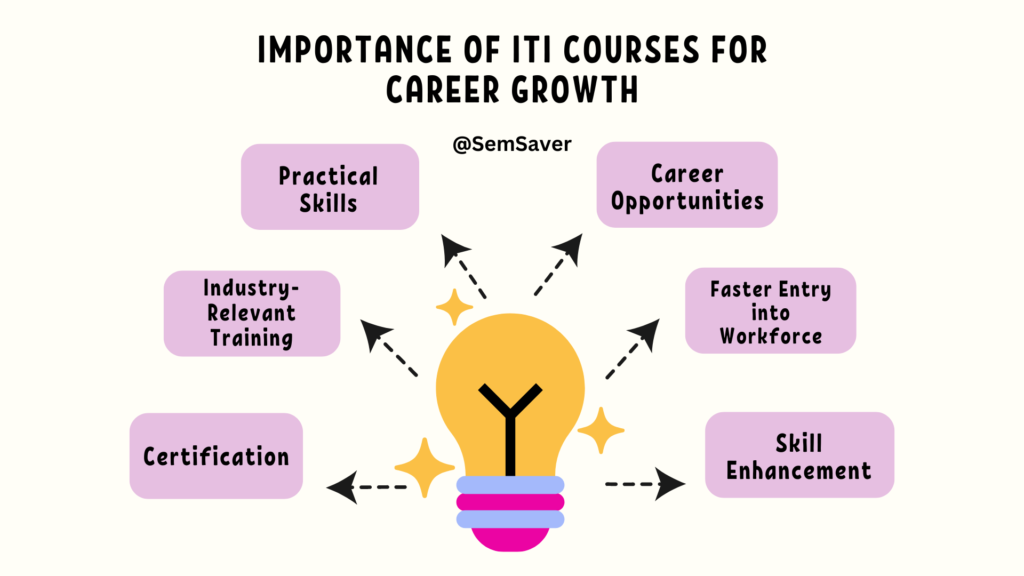It can therefore be very exciting to begin the process of selecting an appropriate job or course to pursue right from your 12th grade or else it will be a very harrowing experience. While overwhelmed by such large amounts of choices, the opportunity to continue with ITI courses after the 12th provides learners with a more strategic perspective on the programs that are appealing to them due to their applicative focus.
The certificates that come with these courses include the theoretical knowledge and the practical experience that is relevant in the current world employment sector to build up your cart skill for survival. Since there are many possibilities, you can get an opportunity to become skilled technicians, for example, as an electrician or mechanic or, in fact, anything in between ITI courses aims at making the learners ready to tackle challenges that are characteristic of your area of specialization/interest.

Table of Contents
Introduction to ITI courses
What is ITI?
If you have been pondering about what an ITI (Industrial Training Institute) means then you are not alone. ITI stands for Industrial Training Institute which are vocational training establishments that prepare and provide people with specific hands-on training and technical know-how in different fields of the economy. These institutes also afford pragmatic learning which trains the student with the skills to undertake engineering, electronics, mechanics, and other professions. The ITI programs focus on the curriculum that could be useful in the industry and the integration of knowledge that is applicable in the real world allowing students to gain the most promising careers in the public and private domains.
Importance of ITI courses for career growth
- Practical Skills: Most of the ITI courses provide a vocational course structure intended to equip the student with skills enabling him/her to practice in various trades and related fields.
- Industry-Relevant Training: It is for this reason that many of the ITI courses in the region are designed to respond to the prospects of the new market and its encountered issues to equip its graduates with optimum employability skills.
- Certification: The other important aspect of ITI is that artisans get some certification that makes them get employment in the market.
- Career Opportunities: ITI graduates do not have a specific area of industry stream, and they can easily get placed in the engineering sector and electronics sector, mechanics sector, construction industries, and so on.
- Faster Entry into the Workforce: courses for ITI offer employment in a far better manner than the full-length courses which take time to train the students for the job sector.
- Skill Enhancement: ITI courses provide employability skills and knowledge to be able to build oneself and get employable for certain competencies, they can only make the person exist and perhaps be successful in today’s world.
- Hands-on Experience: For this reason, as ITI courses retain their name, they are also very practicable regarding the acquisition of materials and the development of the required skills among learners; therefore, ITI produces valuable pupils for employers.

Types Of ITI Courses
Overview of different ITI courses after 12th with specialization and industries covered
| ITI Course | Specialization | Industries Covered |
|---|---|---|
| Electrician | Electrical systems and wiring | Construction, manufacturing, utilities |
| Fitter | Machine assembly and maintenance | Manufacturing, automotive, engineering |
| Welder | Welding techniques and processes | Construction, fabrication, shipbuilding |
| Mechanic (Motor Vehicle) | Automobile repair and maintenance | Automotive, transportation, logistics |
| Machinist | Precision machining and tooling | Manufacturing, aerospace, defense |
| Draughtsman (Civil/Mechanical) | Technical drawing and drafting | Construction, engineering, architecture |
| Electronics Mechanic | Electronics assembly and repair | Electronics, telecommunications, IT |
| Carpenter | Woodworking and carpentry | Construction, furniture manufacturing, interior design |
| Plumber | Plumbing systems installation and maintenance | Construction, building maintenance, plumbing services |
| Turner | Lathe machine operation and metal turning | Manufacturing, metalworking, machining |
| Instrument Mechanic | Instrumentation and control systems | Petrochemical, pharmaceutical, power generation |
| Refrigeration and Air Conditioning Mechanic | HVAC system installation and repair | Refrigeration, air conditioning, cold storage |
| Computer Operator and Programming Assistant | Computer operations and programming | IT services, software development, data entry |
| Mechanic Diesel Engine | Diesel engine repair and maintenance | Automotive, marine, heavy equipment |
| Painter (General) | Painting techniques and surface finishing | Construction, automotive, manufacturing |
| Information Technology and Electronics System Maintenance (IT & ESM) | IT hardware and electronics maintenance | IT services, electronics manufacturing, telecommunications |
| Tool and Die Maker | Tool and die manufacturing | Manufacturing, engineering, metalworking |

Popular ITI Courses After 12th-high job opportunity, high demand with training structure and duration
| ITI Course | Duration | Training Structure | Demand and High Job Opportunities |
|---|---|---|---|
| Electrician | 2 years | Theory, practicals, workshop training, and internship | High demand due to the need for electrical services in construction, manufacturing, and utilities |
| Welder | 1 year to 2 years | Theory, practicals, welding techniques | High demand in construction, fabrication, automotive industries for joining metal parts |
| Mechanic (Motor Vehicle) | 1 year to 2 years | Theory, practicals, hands-on training | High demand in automotive, transportation, and logistics sectors for vehicle repair and maintenance |
| Electronics Mechanic | 2 years | Theory, practicals, electronics assembly | High demand in electronics, telecommunications, and IT industries for equipment installation and repair |
| Machinist | 2 years | Theory, practicals, machine tool operation | High demand in manufacturing, aerospace, and defense industries for precision metal parts production |
| Draughtsman (Civil/Mechanical) | 1 year to 2 years | Theory, practicals, technical drawing | High demand in construction, engineering, and architecture sectors for drafting and design |
| Refrigeration and Air Conditioning Mechanic | 1 year to 2 years | Theory, practicals, HVAC system maintenance | High demand in refrigeration, air conditioning, and cold storage industries for system installation |
| Computer Operator and Programming Assistant | 1 year to 2 years | Theory, practicals, computer operations | High demand in IT services, software development, and data entry fields for computer-related tasks |
| Instrument Mechanic | 2 years | Theory, practicals, instrument calibration | High demand in petrochemical, pharmaceutical, and power generation industries for instrumentation |
| Turner | 2 years | Theory, practicals, lathe machine operation | High demand in manufacturing, metalworking, and machining industries for precision metal components |
Benefits Of Choosing ITI Courses after 12th
Advantages of opting for ITI over traditional courses
- Practical training: Emphasis on hands-on learning.
- Shorter duration: Quicker entry into the workforce.
- Cost-effective: Lower tuition fees compared to traditional degrees.
- Industry relevance: Curriculum tailored to meet current industry demands.
- High employability: In-demand skills lead to more job opportunities.
- Flexibility: Various program options to suit individual preferences.
- Hands-on experience: Opportunities for real-world skill development.
Career prospects and skill development
- Versatile career options across industries.
- Specialized skills development.
- Extensive hands-on training.
- Recognized certifications.
- Potential for entrepreneurship.
- Lifelong learning culture.
- Opportunities for career advancement.
Eligibility Criteria
Educational requirements for ITI courses after 12th
| Educational Requirements | Description |
|---|---|
| Minimum Age | Generally, candidates should be at least 14-15 years old. |
| Maximum Age | Age limit varies by state and institute, typically between 25-35 years. |
| Educational Qualification | Completion of 12th grade or equivalent from a recognized board. |
| Stream | Candidates from any stream (Science, Commerce, Arts) are eligible. |
| Minimum Marks | Some courses may have specific minimum marks requirements. |
| Subjects | No specific subject requirements, but basic math and science knowledge may be beneficial. |
Entrance Exams and Admission Process
| Step | Description |
|---|---|
| Check Eligibility | Ensure you meet the eligibility criteria, typically 10th or 12th grade from a recognized board. |
| Research | Explore available ITI courses, considering factors like specialization and job prospects. |
| Application | Obtain and fill out the application form either online or from the ITI institute. |
| Submission | Submit the completed application form with required documents like mark sheets and ID proof. |
| Merit List/Selection | Institutes may release a merit list based on academic performance or conduct counseling sessions. |
| Admission Confirmation | Follow instructions for admission confirmation, including fee payment and document verification. |
Job Prospects After Completing ITI-skills, financial Investment, scholarships
| Aspect | Description |
|---|---|
| Job Prospects after Completing ITI | – High demand for skilled workers in various industries such as construction, manufacturing, automotive, electronics, and more. |
| – Opportunities for employment as electricians, welders, mechanics, machinists, draughtsmen, technicians, and other specialized roles. | |
| Education Growth with Acquired Skills during ITI | – Acquisition of practical skills and hands-on training in specialized trades. |
| – Enhanced employability and career advancement opportunities through skill development and industry-specific training. | |
| – Potential for further education and skill enhancement through advanced courses, diploma programs, or apprenticeships. | |
| Financial Investment and Scholarships in ITI | – Relatively lower tuition fees compared to traditional degree programs, making ITI courses a cost-effective option for vocational training. |
| – Scholarships, grants, and financial aid may be available for eligible students from government schemes, NGOs, or industry partnerships. | |
| – Opportunities for on-the-job training or apprenticeships with stipends or financial assistance from employers. |
Tips For Success In ITI Courses
- Be Regular: Attend classes regularly for both theory and practical sessions.
- Take Notes: Keep detailed notes during classes and practical sessions.
- Practice: Regularly practice hands-on skills in workshops or labs.
- Ask Questions: Don’t hesitate to ask your instructors if you’re unsure about something.
- Collaborate: Work with your peers on projects and assignments.
- Seek Help: If you’re struggling, seek guidance from your instructors.
- Stay Updated: Keep yourself informed about industry trends and advancements.
- Review: Review your notes regularly to reinforce learning.
- Manage Time: Balance studying, practicing, and relaxation effectively.
- Take Care: Prioritize your physical and mental well-being for better performance.
Conclusion
On its own as well as combined with other options, entering into an ITI opens a myriad of opportunities for the takers. Stipulating, training through practical sessions, education that favors the industry, and vocational courses to mention but a few include ITI which provides courses that are undertaken after the completion of twelfth standard education leading to promising careers in trades and industries. Self-discipline helps to achieve one’s goals and become successful in various fields: eng electrician, welder, mechanic, etc. Since the practice sessions are often coming to practice, the working process form morning till night is strictly focusing on exercises, learning , motivating and inspiring each other to achieve the goal.
ITI passed deserving candidates must be given well-paid employment packages also they must help in the all-round development of the specific line of business where they are going to be posted. So it means that every student those especially those who have completed their high school or anyone who is feeling a mid-career want for higher skills then there is a successful and happy life waiting for all of them in the ITI courses after 12th.
FAQ’s
- Are ITI courses suitable for all streams after the 12th grade?
- Yes, ITI courses are open to students from all streams—Science, Commerce, and Arts. They offer specialized vocational training regardless of the academic background.
- What is the duration of ITI courses after the 12th?
- The duration of ITI courses typically ranges from 1 year to 2 years, depending on the specialization. Some courses may have shorter or longer durations based on the curriculum requirements.
- Do ITI courses offer job placements after completion?
- While ITI institutes may not guarantee job placements, they provide valuable skills and certifications that enhance employability. Many graduates secure job opportunities in industries like construction, manufacturing, automotive, and electronics.
- Can I pursue higher education after completing an ITI course?
- Yes, ITI courses offer pathways for further education and skill enhancement. Graduates can pursue diploma programs, advanced courses, or apprenticeships to further their education and career prospects.
- What are the eligibility criteria for ITI courses after the 12th grade?
- To enroll in ITI courses after the 12th grade, candidates typically need to have completed their secondary education (10th or 12th grade) from a recognized board. Specific eligibility criteria may vary by institute and course.
Read more
- Guidewire Online Course: Your Key to a Successful Developer’s Career (9 Courses)
- All Degree courses list for MPC (PCM) Students After the 12th.
- 5 Benefits of IIT Patna Online Courses for Career Growth
- ISRO Online Course for Students / Free Courses With Certificate
- Don’t Miss these Best Government Free Online Courses With Certificates 2024
- Unlock Lucrative Career Paths with High Salary Courses after 12th Science
- Don’t Miss Best IIT Courses After 12th



I precisely had to say thanks once again. I do not know what I could possibly have undertaken in the absence of the type of points shown by you on this question. Entirely was a real difficult matter in my position, nevertheless noticing your skilled style you dealt with the issue forced me to leap for fulfillment. I am happy for your information and as well , wish you really know what an amazing job your are doing teaching the rest via your website. More than likely you have never got to know any of us.
I’ve been absent for a while, but now I remember why I used to love this site. Thank you, I’ll try and check back more frequently. How frequently you update your site?
Thanks for all your valuable efforts on this site. My mother enjoys managing investigation and it’s really easy to see why. We all hear all concerning the compelling means you create precious guides on your website and in addition foster contribution from the others on the topic then my child is actually learning a lot. Take advantage of the rest of the new year. You are always carrying out a superb job.
I believe this internet site holds some very great info for everyone : D.